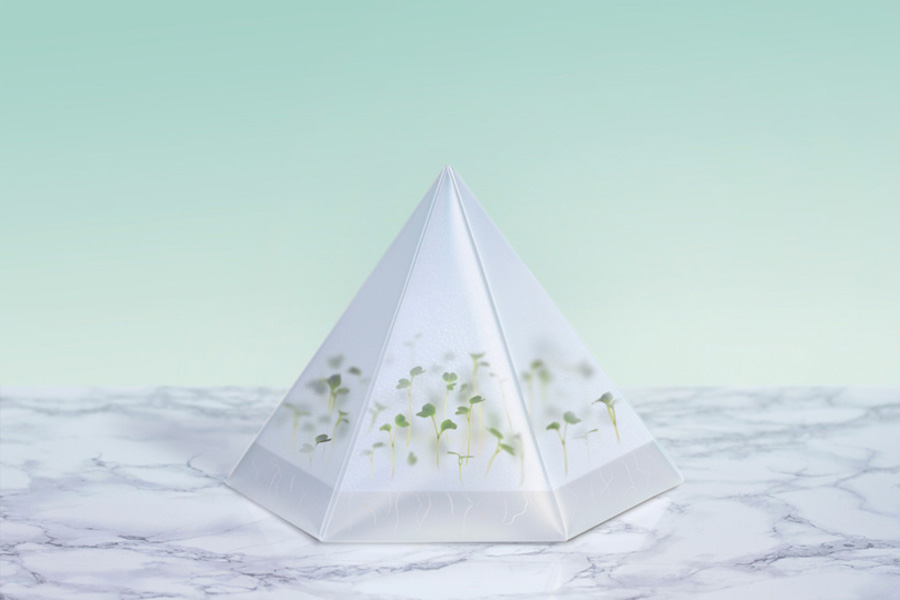
05 Dec Wrapping Up (And Eating) The Future: Tomorrow Machine’s Sustainable Packaging
I’ve got two kids, a home office, and my husband happens to be one of my favorite chefs in the world, so we probably eat at home more than anyone else I know. I’ve learned firsthand that no amount of planning, bulk purchases, and eco-friendly tips can hide the fact that food-packaging waste is a substantial (and alarming) part of our daily rubbish. When I stop and think of the yogurt cups, the water bottles, the granola bar wrappers, the cracker boxes and the plastic bags, just to name a few, it’s plain to see that the buildup is actually pretty ridiculous. Every year, the United States generates approximately 230 million tons of trash (which comes to about 4.6 pounds per person a day). Less than one-quarter of it is recycled; the rest is incinerated or buried in landfills. Want to put it in perspective? Just think of the times a week you need to empty that cute little trash can under the counter, multiply it by the number of people in Austin, which is almost at a million… and then multiply by 300, just to count the US. It’s time for better, sustainable packaging.
To address the issue, a very interesting project by the name of Tomorrow Machine has sprouted out of Sweden. Their design studios, based in Stockholm & Paris, specialize in highly innovative packages, products and food concepts. By creating biodegradable, fast dissolving and uber-green packaging, they plan to change the industry forever. Tomorrow Machine’s aim is to improve the experience of mainstream consumers, by applying research, new technologies & intelligent material. Winner of the 2013 Dieline award for Sustainability, Tomorrow Machine wants to transform the process of disposing of our containers with some solutions that truly puzzle the mind. Designers Hannah Billqvist and Anna Glansén have a few inventions that fall under two novel approaches to sustainable packaging: food wrappers that can change shape to double as a dish or bowl, and packaging that’s meant to be composted or washed down the drain. Tomorrow Machine’s first invention was the Sustainable Expanding Bowl.
RECOMMENDED: Where is Creativity is Still Thriving? 6 Great Cities for Creatives and Eclectics
A biodegradable, cellulose wrapper fits snugly around freeze-dried food. By pouring hot water into a spout, the food cooks instantly while the wrapper blossoms open and morphs into a bowl. They are now working on their newer series, called This Too Shall Pass. The concept behind it is for packages to naturally decompose or to dissolve in water. The line has three foods: Basmati rice, olive oil, and a raspberry smoothie. The whole point of the project, Glansén says, is finding an alternative to plastic. “The good thing about plastic is that it does not react with other materials very easily,” she says. “But that is also the bad thing about plastic because it means that it makes the natural decomposition process difficult.”
In their effort to apply intelligent materials (and genius design!), they have taken into consideration combining substances that don’t react to each other. The olive oil, for example, comes in a wax- coated caramelized sugar container. But that couldn’t work with the smoothie, because water breaks down sugar. But the smoothie or fresh fruit juice could come in an agar seaweed gel container. Once it’s un-refrigerated, “the package will wither at the same speed as its contents.”
MUST READ: Smarter Green: Respecting Nature for a Sustainable Lifestyle
However, getting all of this to market is a costly endeavor. Glansén predicts that we’ll see this type of packaging on shelves in five or so years. For now, there is one of Tomorrow Machine’s inventions that will actually go on sale fairly soon. Microgarden is a tiny, paper greenhouse that uses agar seaweed to grow micro-greens and herbs. Infarm, a small German company that builds micro-gardening solutions for homes and businesses, will carry it online.
Although it may seem that these inventions are a fascinating glimpse into the packaging future, designers have admitted their inspiration is drawn from things as old as time: the peels and shells of fruits and eggs. Today, the only reason people don’t eat orange peels, for instance, is because they’re sour and unpalatable. Tomorrow Machine’s waxy packages are too bland to eat right now. But that doesn’t mean a tasty peel (or wrapper, or shell) could be too far off. Less trash, less dishes to do and edible wrappers, sign me (and my kids) up for that!
This article was originally published in the October 2014 Issue of VETTA Magazine.


